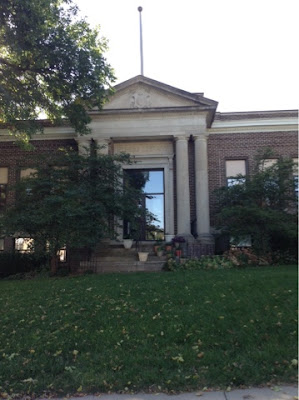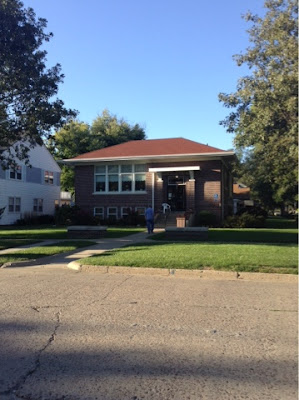At the first cafe I stopped at in Iowa I was startled by a burst of laughter coming from a table of two elderly couples and the almost joyous exuberance of their conversation. That wasn't something I had encountered in Nebraska. The Nebraskans weren't necessarily repressed and downtrodden, but their economy certainly seemed so, as reflected by the sorry state of most of their towns and their Carnegie Libraries, and that couldn't help but be reflected in the demeanor of its people. In comparison with those in Iowa, they seemed to be more coping with life than enjoying it.
The towns in Iowa were pulsing with life and weren't run down as were those in Nebraska. The grass was green and the paint wasn't peeling and faded. Vacant store fronts were a rarity. Small towns had coffee shops and other non-essential businesses, such as florists, that implied a healthy economy. And the Carnegie libraries had a shine to them. Most had had an addition to cater to the growth of the towns, while those in Nebraska hadn't had that need. The people aren't so much to blame, but rather one state having rich and productive soil and the other not so much so. Even Iowa’s late fall withering brown corn stalks were much hardier than those of Nebraska.
With folk seemingly scraping by in Nebraska, as if they're just trying to hold on, clinging to a frontier-mentality, people have a common bond and look out for one another. When I had one final flat tire late in the afternoon as I neared the Iowa border, two motorists stopped to offer help. One even offered a Subway sandwich he had just bought. A few days earlier someone else asked if I needed money as I sat eating a peanut butter sandwich under a tree. He was astounded I was bicycling to Chicago. He didn't think such a thing was possible.
My flat tire was an exclamation point on the bad luck that has dogged me on this trip. I thought my slow-leak woes were behind me when I put one of the three brand new tubes that I had bought at Walmart a couple of hours before in my rear tire. It wasn't totally necessary, as I had been nursing a super-slow leak for several days that only required a small amount of pumping at the start of the day and then again mid-afternoon. But during a rest break I decided to replace the tube and be done with this extra pumping that was a strain on my injured shoulder. Two miles down the road I could feel the tire going soft. When I took out the tube and reinflated it to find the puncture, I discovered the tube had a blemish in it and I had been sold a tube with a hole in it.
I should have been wary, as when I opened the box the tube came in, I could see that someone had already opened it and ineptly stuffed the tube back into the box. I assumed that whoever had bought it hadn't meant to buy a presta valve tube and had returned it. Instead, they returned it after either discovering it had a hole or puncturing it themselves. "Only at Walmart," one might say. And only on this trip with so much I'll-fortune starting with a brake pad wearing out on a long steep descent and even worse snapping a brake cable on another long descent and the frustration of following Interstate 70 and being detoured onto 80 and pulled over for it and then nearly breaking my collarbone and continually pricking my tires with goat heads and having my tent crumbled by violent winds and rain. Ah, the joy of bike touring. Yes, it is a joy despite all the adversity. Pedaling a bike for hours and hours out in the hinterlands is always revitalizing and knowing that the planet is my campground, equally so. Biking long distances is an emphatic Declaration of Independence that never grows old. Even if I didn't have Carnegie Libraries to search out, I'd still be at it.
The first I came to in Missouri Valley after crossing the Missouri River into Iowa had a huge addition with the original entrance turned into a garden emphasizing its grandeur. It's not an uncommon redesign of a Carnegie ensuring that patrons will use the new, stairless, handicap-accessible entrance.
To the right of the circulation desk above a coffee-maker offering a cup for one dollar hung an original portrait of Carnegie without identifying him.
The Carnegie in Logan twenty miles away had the standard portrait that the Carnegie Foundation offered to all the Libraries in 1935 on the one hundredth anniversary of his birth hanging in its entry. Its addition in 1989 matched the original brick of the library and wasn't detectable looking at it straight on.
Cupcakes and cookies and lemonade filled a table to honor the departure of one of the librarians, adding to its neighborly feel.
Continuing on route 30 another twenty miles took me to the distinctive Carnegie in Woodbine with an addition to its side in 2001.
Unlike Logan, which had Carnegie chiseled over its entry, Woodbine identified itself with a CPL emblem just under its roofline. A plaque beside the door announced the building was on the National Register of Historic Places.
Further down 30 in Dunlap was the first Carnegie without an addition and that no long served as a library. The Word of Life church now held services there.
They had let it fall into disrepair. It was on its way to becoming a ruin with crumbling bricks and peeling paint and missing light fixtures, one missing even a bulb.
Denison was back to a Carnegie with full dignity. One could look upon it without realizing it had a large addition behind it.
The Carnegie in Carroll was addition-free, but it was now the Carroll County Historical Museum. It's facade on three sides was adorned with authors--Homer, Shakespeare, Dante, Milton, Longfellow, Virgil, Dickens, Goethe, Plutarch, Irving, Emerson, Eliot.
Below the windows was a little extra ornamentation of carved books with a "CL" for Carnegie Library.
Continuing on 30 I came to the magnificent Jefferson Carnegie with a large modern addition attached to its side.
On its backside were five banners promoting reading.
At about the half-way point across the state in the college town of Ames was another temple of a Carnegie with a large glassy addition.
Even in this college town I saw no Clinton posters. I haven't seen a one in over a thousand miles, just ones for Trump, though not much more than one or two a day. I was camping in a cornfield and missed the debate. When I asked a librarian the next morning who won, she said, "No one. We're in big trouble."
















No comments:
Post a Comment